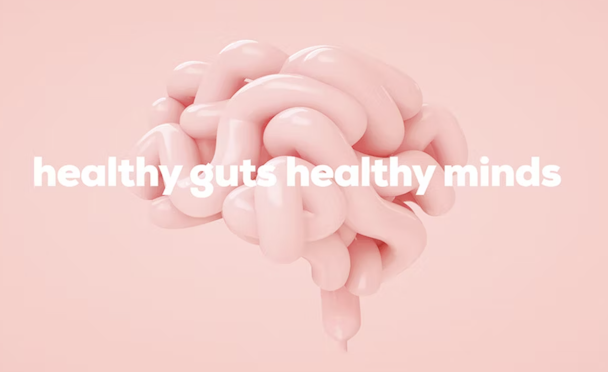Talking shit: how taboo-busting ads from gut health brands have built a $47.8bn industry
There is a huge marketing opportunity opening up in the gut health sector both financially and creatively. The Drum sits down with two gut brands trying to stand out from the crowd.

Social graphics from The Gut Stuff branding / Jones Knowles Ritchie
The gut health market has exploded in recent years with new brands flooding the space and pushing out taboo-busting advertising.
According to Grand Market View research, the global gut health industry was valued at $47.8bn in 2022 and is expected to hit $83.7bn by 2030.
That has presented a huge marketing opportunity. Elizabeth Egan chief executive for Europe at Havas Health & You says she’s seeing an influx of pitches from gut health brands and added: “We’re really excited to have these conversations. It’s a really exciting long term high growth area.”
Advertisement
The explosion of the gut health category makes sense to Egan as the diet industry starts to shake off the outdated “eat less, move more” or “have willpower” messaging. “It’s high in the minds of large segments of the population now to think more than calories in and out,” Egan says. “More and more it’s about the importance of a healthy immune system, sleep, and overall brain health,” which can be aided by looking after your gut.
She credits the rise of ‘welltainment’ for helping raise the topic of gut health into consumers' minds and consciousness. “We’re talking mainstream podcasts on how the gut is one of the most important parts of the body to focus on to keep our overall bodies and minds healthy,” Egan says. For example, The Healthy Gut podcast along with Zoe and The Gut Health Gurus have made household names out of gut experts like Tom Brenna and Tim Spector.
Advertisement
Along with podcasts and ‘welltainment’ many gut health brands are trying to cut through with boundary-pushing creative campaigns, reminiscent of the shifts we've seen in period marketing, in a bid to confront taboo conversations head-on.
The co-founder and chief executive of US probiotic brand Biohm, Afif Ghannoum, tells The Drum the ease and relative cheapness of digital marketing has flooded the market with dietary supplement brands all pushing similar pill bottle ads and using influencers. “The problem with that is it’s all complete white noise to the consumer, all these ads look the same,” Ghannoum says. “It’s really hard to stand out in the space.”
To break through the “clutter” Ghannoum briefed its agency Dirty Jack to “think Human Centipede and dial it back by 20”. The outcome was ‘Uncomfortable ads for uncomfortable tummies’, a series of social ads which, if in the UK would not make it past a regulator.
“The idea that if you couldn't get someone's attention through an awkward ad, then people might go to our website and find out about the science,” Ghannoum explains. “If you aren’t willing to push the envelope, within reason, there's so much crazy stuff on the internet you won’t break through.”
Suggested newsletters for you
Also keen to avoid being seen as a “white clinical” health brand is the UK based The Gut Stuff. Set up by twin sisters and radio DJ’s Lisa and Alana Macfarlane, The Gut Stuff broke into consumer conscious by putting poos adverts on UK bus stops and using pink balloons to represent the gut.

“We approached gut health from a matter-of-fact way because we hadn’t come from the industry or an FMGC background, so our tone of voice was just very natural,” Lisa Macfarlane says. She admits when they started the company, they didn’t know what they were doing so they brought in agencies JKR and Revolt for in exchange for equity. The outcome was a brightly branded product: “The tone of voice and the marketing strategy came from a perspective of how can we tell our pals about guts,” she says.
Although it's crucial to The Gut Stuff and Biohm that their offering is rooted in science both brands revealed that capturing a wider audience leading with science won’t work.
“The sophisticated science is too much for the average consumer, so you have to connect with what is the product actually going to do for them,” Ghannoum says. “When you talk to people about gut health and probiotics and organisms it doesn’t mean anything.”
The Gut Stuff is making gut health accessible through its Channel 4 primetime TV show which is averaging seven million weekly views and runs gut education sessions at offices and construction sites across the country.
The Macfarlane sister’s strategy has been to “always speak to Barry in his flat in Bolton who doesn't give a fuck about gut health, and then always go back to the scientists and efficacy otherwise, it could very easily blow up in your face, and become to woo woo.”
A Channel 4 show called Know Your S**t: Inside Our Guts is a true marker of far the gut health market has gone in breaking down a taboo topic. It's also a good signifier of consumer appetite for solutions to their gut woes.
Egan says in the next phase of this booming category, consumers "will start to weed out the foods and drinks and products that are just ‘gut washing!’ and not really making a clinical difference".
"Thank goodness we are making long overdue shifts towards prevention rather than just cure," she says.

